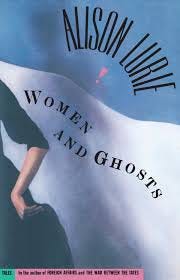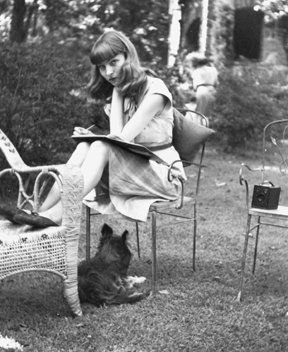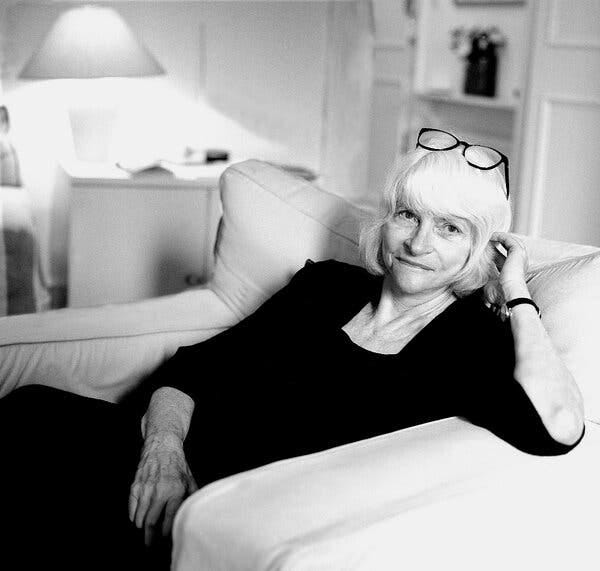Readers unfamiliar with “Another Halloween” may prefer to read these notes only after reading the story.
[….] the streets are full of weird-looking dwarfish creatures, monsters and witches and animals running on their hind legs. You might say, Oh, they’re only our kids, and other people’s kids. But how do you know for sure?
Alison Lurie
The position of women in society has been a fruitful subject over two centuries of horror fiction. Alison Lurie (1926-2020) used the mode with great wit and polish for such examinations. Her 1994 short story “Another Halloween” is an excellent example.
The story also demonstrates a deft use of the holiday as a trigger for apparently supernatural events impossible around other holidays. It is, after all, the only holiday whose lore focuses on the thinning of liminal barriers between this world and others.
"Another Halloween" begins with first-person narrator Ruthie providing a long view of the day’s history.
In ancient Rome, where the whole thing started according to what I’ve read, they called it the Day of the Dead. That was who came back every year and they didn’t come back in good shape or in a good mood. The dead were disoriented and destructive, like people in a late stage of Alzheimer’s. They slid out of their tombs at sunset and drifted through town in their trailing, rotted grave clothes, gabbling unintelligibly in Latin. It’s in Shakespeare: “the sheeted dead/Did squeak and gibber in the Roman streets.” People left out saucers of food and drink, and barricaded themselves in their houses, which was probably the smart thing to do.
The “destructiveness” of the dead will find an echo in Ruthie’s own narrative.
She moves quickly at this point to drolly recount an episode that took place over several Halloweens when she was a young wife and mother.
I don’t care much for Halloween, not since what happened to a woman I knew called Marguerite Robbins. She lived next door to us in Corinth when our children were small, in one of a block of clunky frame houses, too close together. They were roomy inside though, with big old kitchens and deep front porches. I was really close to a couple of the other young mothers on the block; they were like family, maybe better than family.
It wasn’t that way with Marguerite. But her Jamie was our Joel’s age, and they were best friends, so we met practically every day. We got on well enough; but I always felt kind of overgrown and clumsy around her; she was so daintily pretty: pale blonde, with a round baby face and short-fingered hands like an expensive doll. Her nails were a matched set of tiny perfect polished shells. She wore rubber gloves for housework, and makeup even at breakfast: powder-pink lipstick and powder-blue eye shadow.
Also she made me feel noisy. She had the sort of cool manners that always make me think of words like pleasant and cordial. She never had much to say, or raised her voice, and she didn’t like it when somebody else did. If I blew my top because Joel’d wet the bed again, or the washer wouldn’t drain, she would murmur, “Oh, that’s too bad,” and literally move back, as if a wave full of dirty seaweed had slopped too close to her on a beach.
The first Halloween
Ruthie and her son Joel join Marguerite and her boy to hand out candy to trick-or-treaters, though Marguerite's idea of candy is apples and tiny boxes of raisins.
[….] the bell rang again. I heaved myself up in case it might be someone I knew, though I was eight months pregnant and felt like a bathtub on wheels. There were four or five kids: a cute lady pirate, a Mickey Mouse, and a couple of tramps with burnt-cork mustaches and eyebrows, but nobody I recognized.
Marguerite handed out the health food and shut the door, and then she turned and asked in a wound-up voice, “Ruthie, who was that child in the rabbit costume?”
I hadn’t noticed any, I said.
“In back of the others. She was wearing one of those bunny sleepers with feet, and a white mask.” I shook my head.
“You must have seen her,” Marguerite insisted. “About five years old, and she had an old wrinkled white pillowcase for a bag.”
“Nope; I’m sorry.”
Marguerite gave me a look that said I was stupid and unobservant….
“It’s just—” she said, holding her cup in both doll’s hands, not looking at me but out the window at the light from her jack-o’-lantern wavering on the porch railings. “You see, when I was a child—The little sister of a girl I knew was hit by a car on Halloween, and she was wearing a costume like that. So it rather upset me.”
“Well, hell, of course,” I agreed. “What an awful thing to happen!”
“I wasn’t involved, actually,” said Marguerite. “I knew her by sight, that was all. But it was rather awful. More coffee?”
The second Halloween
Next Halloween Ruthie takes Joel and Jamie for their first trick-or-treat; Marguerite stays home to hand out treats.
[….] Well, next morning just after Joel and Jamie had left for day care there was a knock at the back door, and it was Marguerite. Which was odd to start with, because she always phoned first to see if it was a “good time” to come over.
She looked terrible. Her pink lipstick was on crooked, and her flowered blouse was buttoned wrong, so that one side of its Peter Pan collar seemed about to take off….
Then she leaned forward and said in a kind of loud whisper, “I saw her again, Ruthie. That same little girl who came to the house last year.”
“Little girl?” I said. Then I remembered. “You mean the one in the bunny costume, that reminded you of some kid you once knew.”
“Yes, did you see her?”
“No, sorry. But of course we weren’t out long.”
“She came again.” Marguerite announced this as if it were some really bad world news.
“Oh yeah?” I was skeptical. “Are you sure it was the same one? I mean, hell, there must have been lots of little kids out last night in those bunny sleepers. Besides, you know most children won’t wear the same costume two years running. You remember that fairy getup with the gauze wings Josie made for Mary Lou last year, a size too large so she could use it again, only now Mary Lou doesn’t believe in fairies, she had to be a space pilot—” Then I happened to look at Marguerite’s face and shut up.
“It was the same little girl,” she said. She was tormenting the paper napkin I’d given her, twisting it round and round….
Then she leaned forward and said in a kind of loud whisper, “I saw her again, Ruthie. That same little girl who came to the house last year.”
“Little girl?” I said. Then I remembered. “You mean the one in the bunny costume, that reminded you of some kid you once knew.”
“Yes, did you see her?”
“No, sorry. But of course we weren’t out long.”
“She came again.” Marguerite announced this as if it were some really bad world news.
“Oh yeah?” I was skeptical. “Are you sure it was the same one? I mean, hell, there must have been lots of little kids out last night in those bunny sleepers. Besides, you know most children won’t wear the same costume two years running. You remember that fairy getup with the gauze wings Josie made for Mary Lou last year, a size too large so she could use it again, only now Mary Lou doesn’t believe in fairies, she had to be a space pilot—” Then I happened to look at Marguerite’s face and shut up.
“It was the same little girl,” she said. She was tormenting the paper napkin I’d given her, twisting it round and round….
During the next few days I asked almost everyone on the block, only it turned out nobody had seen any bunny rabbits. I finally decided the kid must have come in a car, the way you heard people from the projects do sometimes. They get their children dressed up and take them to some part of town where they can collect expensive candy, and maybe even money. Of course the right part of Corinth for that was on the other side of the campus, but maybe whoever was driving the car didn’t realize it till their kids had been to Marguerite’s house on the corner and collected her depressing apples and raisins….
Ruthie is quick to realize Marguerite’s childhood trauma is worse than Marguerite herself can admit. Is Marguerite telling the truth about the accident? Lurie hints not.
The story context is then expanded slightly. Ruthie reflects on the fact that Marguerite does not participate equally in the division of parental work in common with other neighborhood moms.
[….]I had a one-year-old and a four-year-old and I was trying to hold down a part-time job and half-asleep on my feet most of the time. Marguerite seemed to be okay again, only I was getting kind of tired of her. We’d been living next door for over two years, but after that once she would never talk about anything personal. If you asked who she liked in the local elections, or if she’d been happy in kindergarten, she’d just give you that cool polite little smile and say, “I haven’t thought about it,” or “I really can’t remember.” And I’d begun to notice that she always did a little bit less than her share of driving and watching the kids, something Fred and other people had mentioned a while back.
Most of the other mothers on the block were seriously fed up with Marguerite by this time, especially Josie, my best pal across the street, who had never forgiven her for refusing to help campaign against the waste-disposal plant. Marguerite had remarked that after all, by the time the plant was built most of us would probably have moved away. If you knew Josie, you’d know that was about the worst excuse anybody could have thought of.
The last Halloween
It was an unpleasant night: cold and wet, with rain leaking down through the bare trees, and drifts of greenish-grey fog rising from the pavement. Joel was got up as a red dinosaur—what a job that had been—and Jamie was some kind of space monster. They both thought they were pretty fierce; they kept growling at everyone we met, and they’d refused to wear their slickers. Also they didn’t want us to come to the door with them—we had to wait on the path out of the light, under our umbrellas.
When we were halfway around the block and on our way home I happened to look down the street and saw a bunch of kids crossing the road, maybe thirty feet away. The smallest one, trailing behind the rest, was wearing a bunny sleeper.
That was when I made my first bad mistake. I said to Marguerite, “Hey, look, there’s a kid in a rabbit costume, like the one you saw last year.”
She went all white and funny. “Where?” she squeaked, and stared round like someone who hears an explosion and doesn’t know what direction it came from.
I pointed down the street. The little kid had stopped at the far corner and was looking back at us. She gave a kind of wave, or maybe she was just trying to get a better grip on the pillowcase she was dragging, and then she went on, running to catch up to the others.
“I’ve got to see—Would you mind? I’ll be right back,” Marguerite said.
“Sure, that’s okay,” I agreed. I figured Marguerite would find out who the kid was, and get over being knocked sideways every time she saw a rabbit.
Marguerite didn’t even say thanks. She was already hurrying down the wet sidewalk: running a few steps in the high heels she always wore, then walking a few, then running again.
“Wait for me!” she called. But the rabbit was only a white blob now down at the end of the next block, and it didn’t stop; maybe it hadn’t even heard.
That is the last that Ruthie or anyone else sees Marguerite alive. She is struck by a car while chasing her rabbit.
Ruthie is left to ponder.
I think about it sometimes. I tell myself that Corinth was probably full of bunny sleepers that night, and that lots of people give their kids old pillowcases to collect candy in. I try to believe I just imagined that the rabbit’s mask had one ear bent down; or that even if it did, it wouldn’t be anything to get into a state about.
Among the many great strengths of the story “Another Halloween” is the way Ruthie’s initially sometimes exasperated skepticism is transformed into surrender before this puzzle.
Ruthie says she has many good and close friends in the neighborhood, but her only story is about Marguerite, whom she never cared for and whom she found so easy to distance. Ultimately, Ruthie comes to the conclusion,
[….] Now I believe women have to take responsibility for other women, even ones they don’t much like. And I think that if I’d gone after Marguerite maybe I would have been in time.
Alison Lurie
In supernatural horror fiction, one mistake often leads to another or to a combination of others that persists long afterward. As a child, Marguerite contributed to a mistake that cost a child's life; as an adult, on the last night of her life, she apparently felt it was time to face the consequences of that action. Ruthie realizes too late her own failure of judgment.
Which leaves Ruthie anxious about the next October 31st.
[….] sometimes I’m convinced she’s still out there, and I’ll see her again. Not the little girl in the bunny costume: Marguerite. I can’t get rid of the idea that some Halloween night when I look out past the little witches and clowns and spacemen on our porch, she’ll be there too: standing halfway down the path in her pale raincoat under a bat-black umbrella, waiting for me.
Jay
Audio version here:








